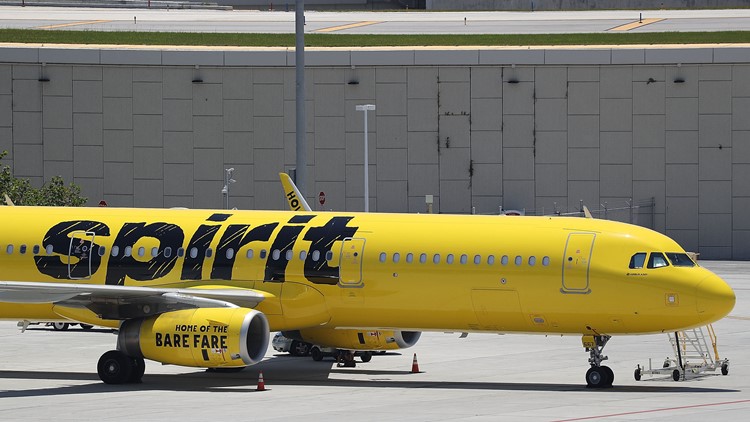Spirit Airlines is introducing a new fee, but it's for an option the carrier thinks customers will be happy about: in-flight Wi-Fi.
Spirit announced Friday that it will become the first North American no-frills “ultra low-cost carrier” to add that capability, unveiling an aggressive plan to equip its entire fleet of about 120 planes with Wi-Fi by next summer.
Spirit touted the move as fitting into a broader strategy to “invest in the guest" and its ongoing effort to improve customers' experiences with the carrier.
It’s an abrupt turn for Spirit, sometimes referred to as “America’s most-hated airline” — a tag earned earlier this decade when it struggled with on-time performance, customer complaints and an uneven roll-out of what was then a new fee-heavy business model.
But that has changed, says Spirit president Ted Christie, who points to an on-time arrival rate that recently has been among the industry’s best and an improving rate of customer complaints.
Christie says adding Wi-Fi is is part of an "evolution" that's proving low-fare budget air travel doesn’t have to be awful.
“Someone who may have traveled with us five or six years ago is going to have a completely different experience today,” Christie says in an interview with USA TODAY. “I think that’s what we’re excited to crow about.”
“We can show we are a best-in-class operator,” he says about the carrier’s efforts to improve punctuality and reduce cancellations.
“We can show that our overall onboard experience is improving,” he continues, noting what he calls “the friendliest flight attendants in the business who have now received guest-satisfaction training (and) the newest fleet in America with the cleanest airplanes.”
“And now (that) onboard experience includes Wi-Fi,” Christie says.
Despite Spirit’s apparent kinder, gentler approach to customer service, it is not wavering from its core no-frills, fee-heavy business model.
Wi-Fi will be the latest add-on fee offered by the airline. Spirit says its Web-browsing and streaming options will have an average price of $6.50, “with a cost range expected to be lower or higher based on the route and demand. “
“This price point is going to be very attractive,” Christie says, “given what we know is the overall average charged in the industry today.”
Costs for Wi-Fi on U.S. airlines can vary wildly. Southwest charges $8 a day per device, while Delta offers an advance-purchase $16 “day pass” for 24 hours of access on flights within North America. Often, prices are higher if fliers purchase access at the last minute.
To provide its Wi-Fi service, Spirit has selected Thales Group and its Ka-band HTS (high throughput satellite) service. Spirit believes that satellite-based option will deliver a better service than what’s currently offered on most airlines. Intermittent outages and slow browsing have been top complaints among fliers logging on in-flight at other U.S. carriers that already have the option.
“We found a partner that could deliver a kind of at-home experience to the seat,” Christie says.
The technology provided by Thales will allow Spirit to offer Wi-Fi coverage on 97% of its routes upon launch of the service.
“Remember, we fly into South America, so there are going to be some places there where we won’t quite have the reach. But by 2021, that all will be covered also,” Christie adds, noting Thales’ launch of a new satellite that the carrier claims will “increase speeds and coverage to an unprecedented level in the industry.”
Competitively, Spirit's addition of Wi-Fi will make it the only one among no-frills ultra low-cost carriers like Frontier and Allegiant to have such an offering. It also comes as major rivals American, Delta and United have all added restrictive "Basic Economy" fares meant to compete with the discounters on price while still offering a "full-service" flight.
Asked where Spirit's Wi-Fi effort helps it fit in between those two sets of rivals, Christie says: "For those buyers of airline tickets who are making a decision based on availability of in-flight Wi-Fi, clearly today we’re not reaching them."
What we think we’ve done is solve for that in a way that doesn’t damage the core business," he continues. "We’re just trying to broaden the field of available travelers, and this is another way to do it."
Still, Spirit officials are clear that the addition of in-flight Wi-Fi does not indicate a change from the company's officials to keep costs as low as possible. The company declined to discuss how the Wi-Fi costs would be paid but seemed to suggest that Spirit would not face a significant cost in installing the technology.
"What’s important ... is that we maintain a very low-cost structure," Christie says. "Navigating that with a Wi-Fi provider has been the biggest challenge. The Thales folks rose to that challenge and were creative and came up with a way that delivers a product on our airplane, doesn’t change the company’s cost structure but provides us — and them — with revenue upside and a compelling business case."
Christie touts the effort as one that will benefit both the carrier's bottom line and elevate its standing in a competitive marketplace.
"Basically, we found a way to improve the guest onboard experience, deliver real value, not change the core cost structure and thereby business proposition to Spirit. That’s the most important part about the Wi-Fi announcement," he says.
"Then, what’s really exciting ... is this kind of broader pledge to the guests that we fly today and to prospective guests – people that don't know us yet – that is really reinforcing what we already know and is continuing to evolve about us; which is an improving overall product and value proposition to people who consume low-fare airline travel."



